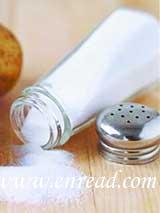我们的身体离不开盐,我们的食物中不能没有盐,可是我们又不能吃太多的盐。这是为什么呢?

The sodium1 and chlorine in salt are electrolytes, minerals that conduct electricity in our fluids and tissues. The other main electrolytes are potassium(钾), calcium2 and magnesium(镁). Our kidneys maintain the balance of electrolytes(电解液) and water by regulating the fluids that we take in and pass out of our bodies. If this balance is disturbed, our muscles, nerves and organs won't function correctly because the cells can't generate muscle contractions3 and nerve impulses.
Too little salt, or hyponatremia(低钠血症), is one of the most common electrolyte disturbances4. You can lose sodium when you sweat or urinate excessively, experience severe vomiting5 or diarrhea(腹泻), or when you drink a lot of water (which is why sports drinks contain electrolytes). Taking diuretics(利尿剂), which make the body excrete excess water, can also cause you to lose too much sodium. Ultimately, hyponatremia can lead to brain swelling6 and death. If you have very strong cravings for salt, you may be dehydrated(脱水) or lacking one of the minerals in table salt. But an extreme salt craving7 can be a symptom of Addison's disease (阿迪森氏病,促肾上腺激素增多症a hormonal8 disorder) or Bartter's syndrome9 (a rare kidney disorder).
If you have too much sodium in your body, you might get very thirsty and urinate more to get rid of the excess. You probably hear about too much sodium, or hypernatremia(高钠血), much more often than you hear about hyponatremia. But sometimes your kidneys can't eliminate all of the excess. When this happens, your blood volume can increase (because sodium holds in water), which in turn can make your heart pump harder. Because of this, some doctors have treated chronic10 fatigue11 syndrome by increasing the patient's sodium intake12.
The National Heart, Blood and Lung Institute recommends that most people consume no more than 2.4 grams of sodium (the equivalent of about one teaspoon) per day. We probably don't need more than half a gram per day to maintain the proper electrolyte balance. Many people eat several times that much.
Excess salt intake has been linked to many different medical conditions, but the links are often controversial. For example, many doctors and researchers claim that a low-sodium diet can help regulate blood pressure (because excess sodium can increase blood pressure). But others believe that reduced sodium doesn't have a significant effect on blood pressure. Too much salt has also been thought to cause heartburn and increase the risk of osteoporosis(骨质疏松症), ulcers(溃疡) and gastric13 cancer(胃癌), but these links are somewhat controversial as well.
Regardless of the latest medical advice about salt intake, it's probably a good idea to pay attention to how much salt you're eating. Fast food and prepackaged convenience foods (like frozen dinners or canned soup) have a lot of sodium because salt helps preserve food by drawing out moisture and keeping out bacteria. So, if you eat a lot of fast food, you may be eating more salt than you think.
 收听单词发音
收听单词发音 



